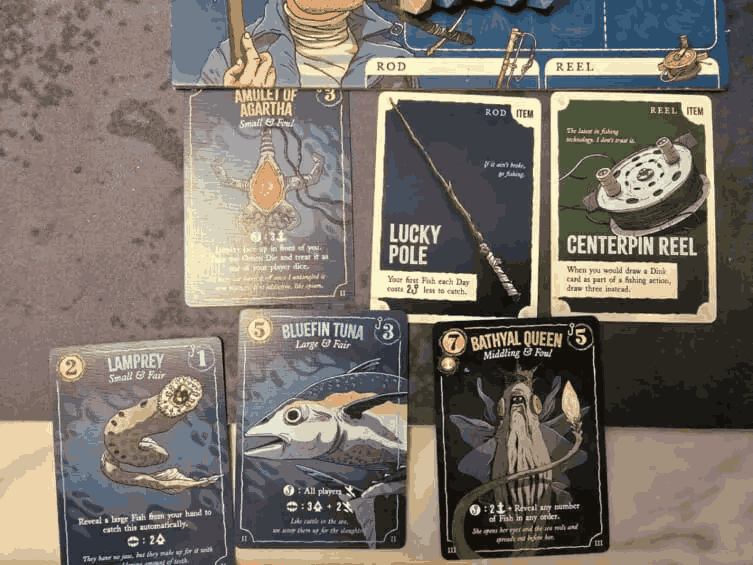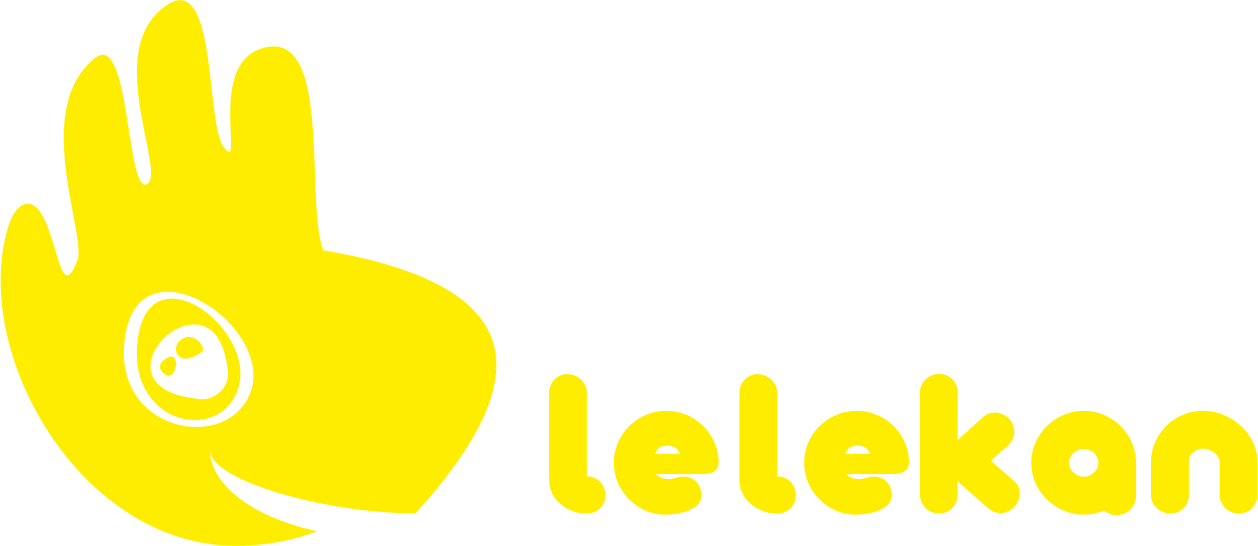Deep Regrets Game Review
Related Products
AWAKENING THE DEEPS
Deep Regrets is a game that seems to have come out of nowhere. It was created by designer Judson Cowan and published by Tettix Games. The theme of the game is steeped in a creepy eldritch fishing atmosphere, similar to the video game Dredge (which is incredibly addictive, by the way - I highly recommend it). As a fan of all things sinister and supernatural, I just had to cast a line and see what would bite. Thanks to an impressive fundraising campaign, the game has generated a lot of buzz, including a micro version from Button Shy, witty and titled Shallow Regrets - with additional additions!
The box design is immediately eye-catching, with a newspaper-box-like wrapper that I’ve never seen before. I even took a second look: at first glance, it could very well be a Christmas present wrapped by my aunt. Add in the fun card illustrations, wry humor, and a fishing-bait-shaped die, and this could be one of the best-crafted board games of the year. But is there a real trophy—or a sunken wreck—hiding beneath the surface of this beautiful design? Grab your tackle box and let’s find out.
DEEP BLUE SOMETHING
Deep Regrets is played over multiple rounds, each representing one day of a week-long sea expedition. The goal of players is to catch valuable trophies to earn points, while simultaneously controlling their insane state (regrets) and overcoming the oddities and dark secrets lurking beneath the surface.
At the beginning of each day, players decide whether to **go to sea or stay in port**. However, the choice made is valid for the entire round (with the exception of the **single-use lifeboat**, which, however, imposes a penalty at the end of the game).
**Port Town** is a peaceful and idyllic place to prepare for your next trip to the sea. Fish caught can be sold for **seabucks**, which can be spent in various shops. They sell additional cubes, disposable supplies, or tackle (rods and reels) that provide permanent bonuses or discounts while fishing. Players can also **attach** fish they catch to one of three slots on their board, receiving a **2× or 3×** multiplier on their points. Attached fish are permanently fixed (although, of course, some cards allow you to bypass this rule).
**The high seas** are where the main action of the game takes place. Players explore **three levels of shoals**, fishing to their heart's content. Each shoal offers different sizes and types of fish - both good and fishy - with different levels of difficulty and points. To catch a fish, the player spends dice, levels of difficulty, and can use cards or abilities to mitigate the consequences or increase the chances.

Some fish activate effects **when discovered**, others **after being caught**. Fish can also be **"eaten"** (i.e. discarded) to trigger a certain effect. These effects can be **helpful**, **harmful**, or just **chaotic** - for example, a cunning squid, which upon discovery is **literally given to another player as a "gift"**. In addition, the ocean hides **event cards** that can significantly change the course of the game.
Players continue to take actions **until they decide to "pass."** At that point, they draw a **dink card** (usually a discount or small bonus) and continue to draw additional "dinks" if they remain in the pass state while others are still playing. There is also a **lifebuoy token** that is passed between players and grants a **discount once per round**.
SADNESS AND MOURNING
What starts out as a seemingly innocent fishing game is actually riddled with regrets - literally. Pulling monsters from the depths of the sea isn't exactly conducive to mental health and often brings up old traumas. Throughout the game, players **gain and discard regret cards** that move their tokens up or down the **insane scale**.
The more stings, the **more dice** a player can hold. However, this has a downside: **disgusting fish** bring **more points**, while **normal fish bring **less**. Even **selling ugly creatures in the port** adds pity (because, apparently, **releasing eldritch horrors to the market is not the best idea**).

Regrets may not seem so terrible — well, **who hasn't done something in life that they regret?** But if you **get too deep into madness**, you'll have to pay the price.
At the end of the game, the **player with the highest total (not quantitative!) regret value** must **get rid of their most valuable trophy** attached to the board. This can mean **losing up to 27 points!**
And if the **deck of regrets runs out**, players start **stealing regret cards from each other**. The number of regret cards each person has is always revealed, but **their value remains a secret**.
FISHING
The fishing expedition concludes at the end of the week. Players tally their victory points—for the fish they have attached, the fish they have left in their hands, and the modifiers from their position on the madness track.
The player with the most regrets must throw their most valuable fish into the sea - and, believe me, no one will begrudge them that.

WITHOUT REGRET
It took me a few plays to figure out exactly how I felt about Deep Regrets. The production is top-notch, and the atmosphere and theme are a real draw. But the question is: is the system solid enough underneath all that shell?
As with most reviews, it all depends on who you ask. I've played it a few times, and opinions range from enthusiastic to mildly dissatisfied.
From a casual player's perspective, the game really shines: the push-your-luck mechanics and balancing of the stings keep things interesting, and the moves are quick and easy. The game is accessible even to beginners, and people who are far from tabletops will probably really enjoy it. I can't think of any other game that feels the same way, so credit to it for being original.
Personally, I liked the game, but the novelty quickly wore off after a few dives into the depths. The game lacks what some call “playfulness.” I’ve heard it said more than once: “It’s like it’s playing itself.” You pull a fish card — you do what it says. There are almost no real complex decisions.
The risk aspect also feels a bit tame: with generous mitigation options, almost any fish can be caught with the right dice and cards, and even the creepy creatures of the deep rarely pose a real threat.

By the end of most games, the **shallows were almost empty**, so players had seen **most of the deck**. Some **interaction cards** force **card swapping** or **passing grief**, but overall it's more of a **lonely boat trip**. The game is **random**, but **without the tension** that usually makes randomness exciting.
The box also features a **single player or co-op mode**, which feels more like a **cozy “mini-campaign”**. Players try to **fill up a discovery log over the course of a week**, gradually **upgrading their gear**. The real vibe is **“Catch them all, like in Pokémon”**.
LET'S DIVE DEEPER
**Deep Regrets** is a **fun and enjoyable game**. It may not become a **permanent resident of your shelf**, but it will provide **a light, fun and unique experience**. Thanks to the unique cards, **every game feels fresh**, and **there is enough charm and atmosphere** to make you want to **re-fill your tackle box and head out to sea**.
This game **doesn't aim to be deeply strategic** — and that's okay. After all, **fishing is for recreation**, right?

At the time of writing this review, a Kickstarter campaign for an expansion is already on the horizon, promising to add more "playability" - and that's exactly what the base game is a bit lacking.
I'm really interested to see how this will broaden and deepen the system.
The regrets in Deep Regrets are deep indeed, but the biggest regret is not trying the game at all.




